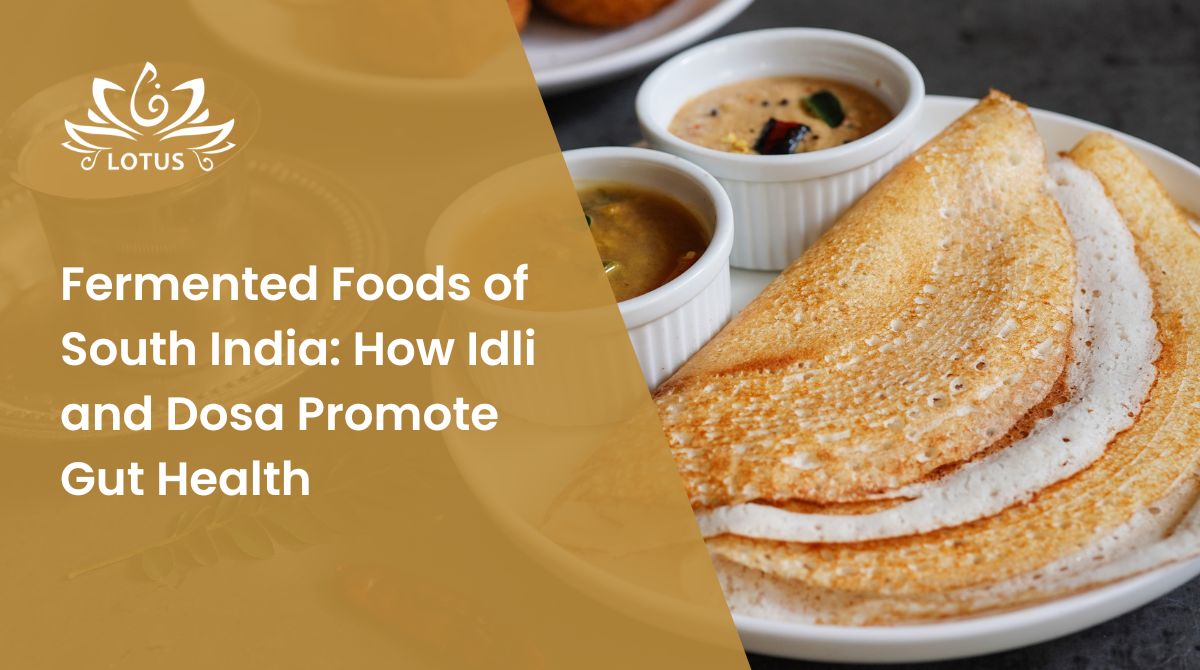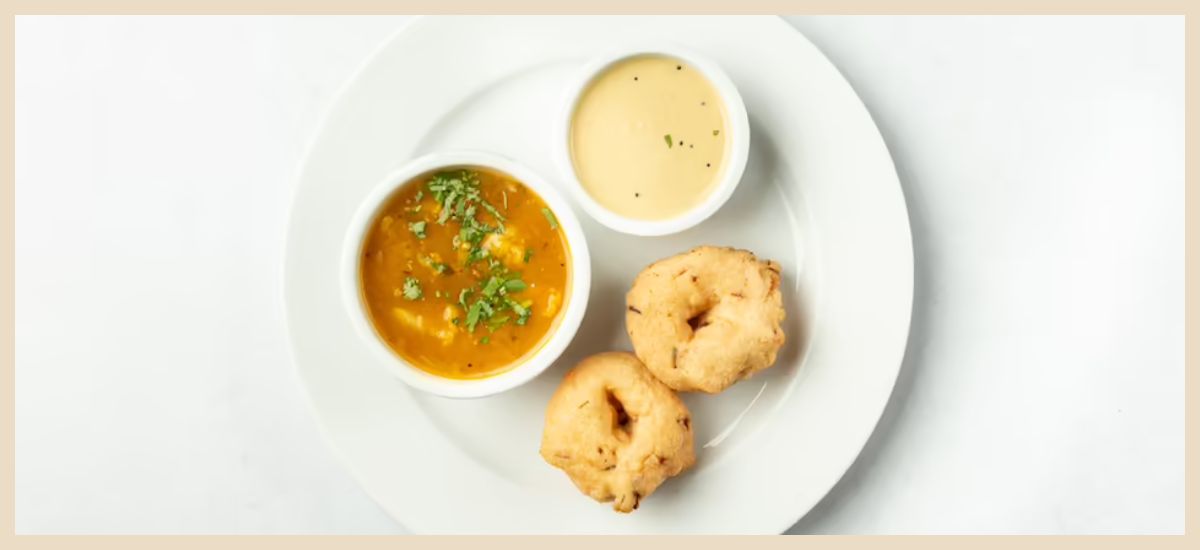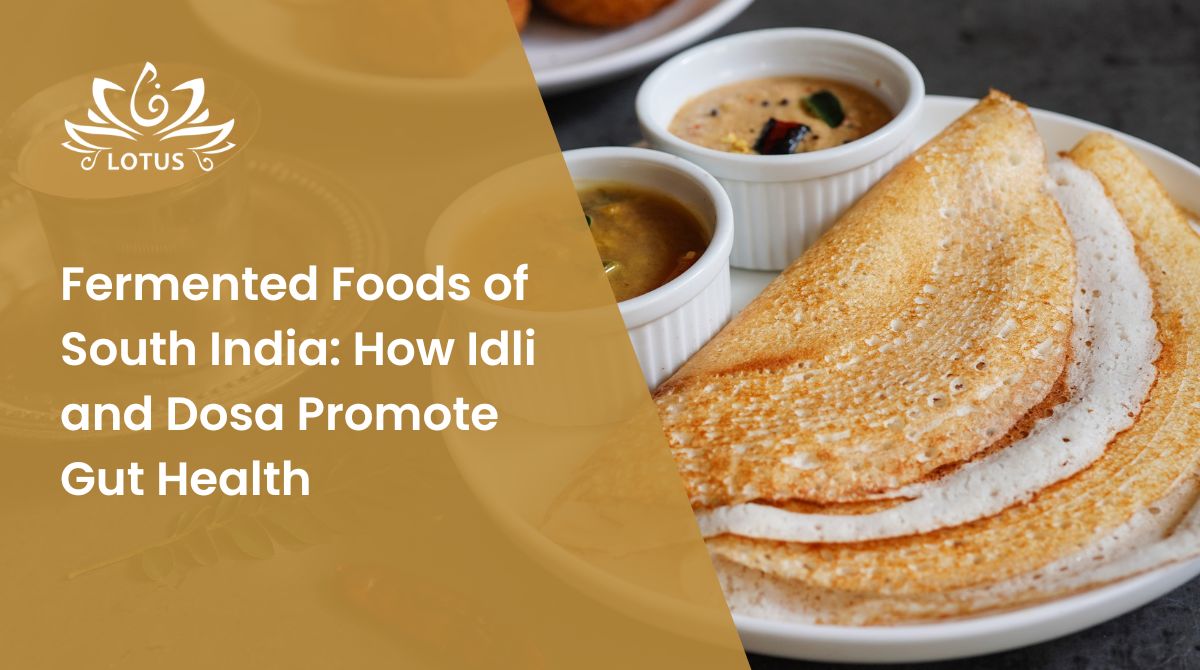South Indian cuisine is a treasure trove of flavors, textures, and ingredients that have been passed down through generations. Among its many delightful offerings, fermented foods such as idli and dosa are central to the diet and beloved by millions worldwide. These dishes not only tantalize the taste buds but also come with a host of health benefits, particularly for gut health. The process of fermentation, a time-honored technique used in South Indian cooking, is more than just a way to preserve food; it plays a significant role in improving digestion and enhancing the nutritional value of food. Let’s take a deep dive into how these iconic fermented South Indian foods promote gut health, focusing on favorites like masala dosa, idli, sambhar, mendu vada, chicken dosa, and ghee dosa.

1. Idli: The Fermented Powerhouse
Idli, a soft and fluffy steamed rice cake, is the quintessential South Indian breakfast staple. Made from a fermented batter of rice and urad dal (split black lentils), idli is rich in probiotics due to the fermentation process. During fermentation, natural bacteria break down the starches in rice and dal, making them easier to digest and absorb.
The probiotics produced during fermentation play a vital role in maintaining a healthy gut microbiome, which is essential for good digestion. The beneficial bacteria help regulate bowel movements, reduce bloating, and even support the immune system. Additionally, the high fiber content in idlis promotes healthy digestion and keeps you feeling fuller for longer. For those with lactose intolerance, the fermentation process also helps break down lactase, making idli easier to digest than non-fermented alternatives.
2. Dosa: A Crispy Delight with Digestive Benefits
The dosa, a crispy and thin pancake made from fermented rice and dal batter, is another beloved dish in South India. Like idlis, dosas are also rich in probiotics, which are naturally created during the fermentation process. This makes dosas an excellent food choice for improving gut health.
Fermented dosas are particularly beneficial for gut health because they are low in phytic acid, a compound found in grains that can inhibit the absorption of essential nutrients. The fermentation process neutralizes phytic acid, allowing the body to absorb the nutrients in the rice and dal more efficiently. Dosas also contain complex carbohydrates that are easily broken down, providing a steady source of energy and promoting digestive well-being.
3. Masala Dosa: The Flavorful, Gut-Friendly Treat
A masala dosa takes the classic dosa a step further by adding a spiced potato filling inside the crispy crepe. The filling, typically made with mashed potatoes, onions, mustard seeds, curry leaves, and turmeric, not only adds flavor but also provides additional digestive benefits.
The spices used in masala dosa, such as cumin, coriander, and turmeric, are known for their anti-inflammatory properties, which can aid in digestion and reduce gut discomfort. Additionally, the combination of the fermented dosa with the warm, flavorful potato filling provides a balanced meal that supports gut health while satisfying your taste buds.
4. Mendu Vada: Fermented Delights for Gut Health
Mendu vada, a savory deep-fried doughnut-shaped snack made from fermented urad dal batter, is a popular South Indian breakfast item often served with coconut chutney and sambhar. Though deep-fried, mendu vada retains many of the benefits of fermentation. The urad dal used in vadas is rich in fiber and protein, which are essential for maintaining a healthy digestive system.
The fermentation process also makes the vadas easier to digest, as it breaks down complex sugars and starches, improving nutrient absorption. Mendu vada, when paired with sambhar (a lentil-based stew) and chutney, offers a combination of probiotics, fiber, and healthy fats that can promote gut health and overall digestive wellness.
5. Chicken Dosa: A Protein-Packed Twist
For those who enjoy a non-vegetarian twist on their traditional dosa, the chicken dosa is a flavorful and nutritious option. In this variation, the crispy dosa is filled with a spiced chicken filling, providing an excellent source of lean protein. While chicken doesn’t contribute to fermentation, the fermented dosa itself still provides digestive benefits.
The addition of chicken to the dosa offers essential amino acids that support muscle growth and repair, while the fermented batter helps in the digestion of these proteins. This protein-packed dosa, paired with the healthy fermentation of the rice and dal batter, ensures your digestive system is nourished and functioning optimally.
6. Ghee Dosa: A Gut-Soothing Comfort Food
Ghee dosa is another variation of the traditional dosa, where ghee (clarified butter) is spread generously over the crispy surface. Ghee, known for its anti-inflammatory and digestive properties, adds an extra layer of goodness to the fermented dosa. Ghee is rich in butyrate, a short-chain fatty acid that helps maintain the health of the cells in the digestive tract and promotes a healthy gut microbiome.
The addition of ghee to a dosa not only makes it richer in flavor but also enhances its ability to soothe the digestive system. Ghee helps lubricate the intestines, improving the movement of food through the digestive tract and reducing symptoms like constipation. Combined with the gut-friendly properties of the fermented dosa batter, ghee dosa is a nourishing treat for the digestive system.
7. Sambhar: A Fermented Lentil Stew to Aid Digestion
No South Indian breakfast is complete without a bowl of sambhar—a spicy, tangy stew made from lentils, tamarind, and a mix of vegetables. Sambhar is an excellent source of plant-based protein and fiber, thanks to the lentils. The fermentation of the lentils helps break down complex carbohydrates, making them more digestible and promoting the growth of beneficial gut bacteria.
The tamarind in sambhar adds a sour note and is known for its digestive properties. It stimulates the production of bile, which aids in the digestion of fats and helps detoxify the liver. The mix of vegetables like carrots, tomatoes, and drumsticks adds fiber and antioxidants, which further support the digestive process.
Lotus: The Ultimate Destination of South Indian Delights in Berlin
If you’re in Berlin and craving these delicious South Indian dishes, Lotus Restaurant in Berlin is the place to be. Known for its authentic South Indian flavors, Lotus offers a variety of traditional fermented foods like idli, dosa, masala dosa, mendu vada, and more, all made with the finest ingredients and age-old recipes. Whether you’re in the mood for a crispy dosa filled with spiced potatoes or a comforting bowl of sambhar to pair with your idli, Lotus Restaurant brings the heart of South India to Berlin. Their menu also features unique variations like chicken dosa and ghee dosa, ensuring there’s something for everyone. To explore their mouthwatering offerings and learn more about their menu, check out Lotus Restaurant’s menu here.

Conclusion: The Gut-Boosting Benefits of South Indian Fermented Foods
Fermented foods are a cornerstone of South Indian cuisine, and dishes like idli, dosa, masala dosa, mendu vada, chicken dosa, ghee dosa, and sambhar are not just delicious but incredibly beneficial for gut health. The fermentation process enhances the digestibility of these foods, boosts the growth of healthy gut bacteria, and improves the absorption of essential nutrients. With their high fiber content, probiotic benefits, and nutrient-rich ingredients, these South Indian foods make for a wholesome meal that supports your digestive system and overall health. So, the next time you indulge in these traditional dishes, you’re not just satisfying your taste buds; you’re nourishing your gut as well!
At Lotus Restaurant Berlin, we take pride in offering traditional South Indian fermented foods that are both delicious and beneficial for your health. Experience the authentic flavors and health advantages of dishes like idli and dosa.
Stay connected with us on social media:
- Instagram: @lotusberlin
Explore more about our offerings and sustainable dining options on Foodmato.

